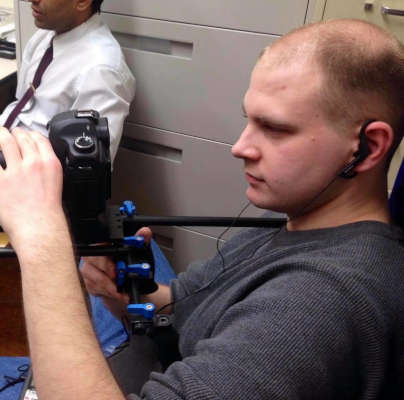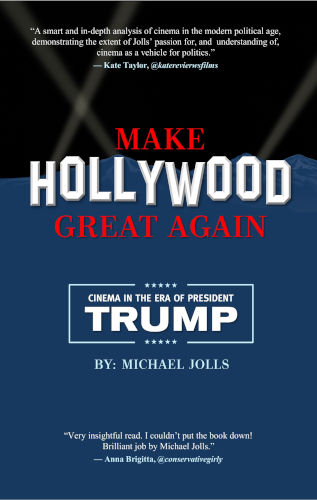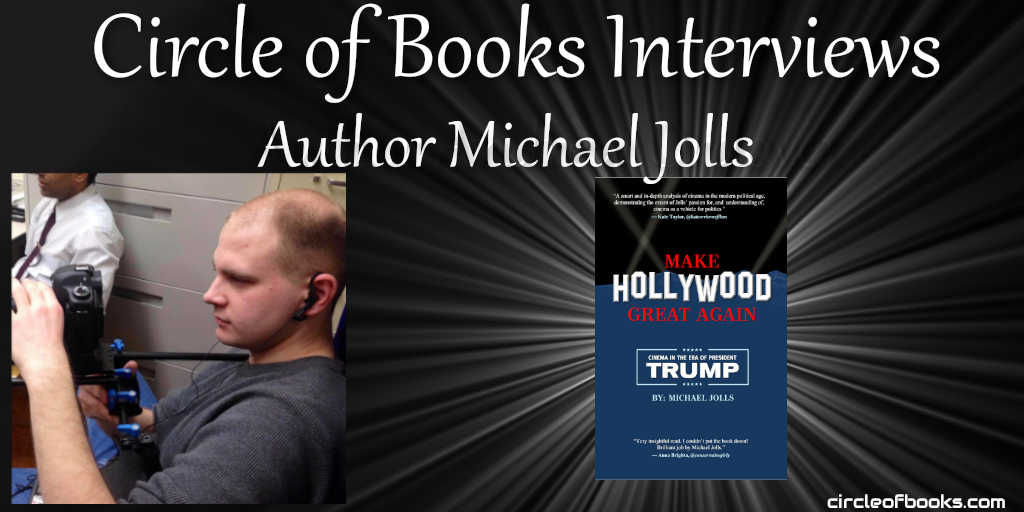Interview Michael Jolls


Interview
– Could you please present yourself to our readers?
“Present?!?” Only if that means we can do this interview in a grand hall and have a stout little man wearing a beret come bouncing forth, holding a banner with my coat of arms and announce my arrival.
– When did you start writing novels/books, what moved you to start writing?
Well, writing itself was something that I was comfortable since junior high school. Fictional short stories or essay answers on tests, etc. The same was true for college, in that a ten-page paper was significantly easier for me than a multiple-choice test.
Getting into the literary world — which was sort of a backwards way — having the opportunity to work as an assistant editor on David Fincher: Interviews (2014) for the University Press of Mississippi prepped me for the level of research that was needed for an academic “study” of that nature. Therefore, when I had the opportunity to start doing books on filmmaking, film criticism, film theory, etc., I already had a sense of what the job required.
– In what genres do you write? Do you plan writing in other genres?
At the moment it’s been two books in film criticism (The Films of Steven Spielberg in 2018, and Make Hollywood Great Again in 2020), one biography (Rev. William Netstraeter in 2019) and one ghost-writing of an autobiography which is still “in the shop” with editors going through it. If I do anymore writing, it will most likely stay within the realm of film criticism, but never say never.
– Tell us about Make Hollywood Great Again. Why should everyone buy it?
Ha! Well, I don’t know that “everyone” should buy it because there’s about eight to ten hours worth of screening time the reader will need to go through to really appreciate the book. Now, if you’re a big movie fan, that’s another story.
The book essentially resulted out of a “domino effect”: the first reason was that politics had gotten incredibly more fascinating since summer 2016, and I enjoyed watching it unfold in the subsequent years. I had the urge to do something with it, you know? Maybe it was a little guilting myself because I spent a significant amount of time in 2018 and 2019 reading modern political books, and I started thinking to myself, “I’m not really paying attention to my film career as much as I should because I’m letting this distract me.”
What became a buttress to that thought was that I had seen a handful of liberal filmmaking colleagues get wholeheartedly consumed with “Trump is evil” hysteria. None of them gave a damn about politics before or were willing to actually get involved with a campaign or, let alone vote. These were people that binged MSNBC, transform into militant social justice warriors and essentially squandered their talent for… for what? You’re a talented screenwriter, a talented screen actor, or producer, etc. Fuel your anger and frustration into doing something having to do with your career instead of wasting time over social media arguments! That was, and continues to be very discouraging to witness.
Anyway, the correlation between cinema and the modern era is such a fascinating topic. I’ve always enjoyed examining the link between what filmmakers put into cinemas and what’s going on in the modern world. Sometime in July of 2019 the lightbulb went off: “Oh hey! I’ve been researching this book for the last three years! I can fuel my political anxiety into something worthwhile.”
That in turn lead to the last reason, and the personal reason why I wrote Make Hollywood Great Again: for me ten years ago. While I kept an eye trained on the presidential elections of 2008 and 2012, the day-to-day events of what was going on in the country just didn’t really appeal to me. Furthermore, because I had embedded myself in college studies and filmmaking, that captivated my attention. Now, there were periodic conversations about modern film and current events, but nothing of substance. A book like this, current movies and modern politics? I would have devoured it! Not to mention… if we’re being totally honest… we know that conversations in college classrooms, particularly “art schools,” are going to be packed with a liberal bent. I have a moderate approach to politics, film and history that I wanted to tackle this book knowing I could do it fairly.
– What is your all time favorite novel/book? What makes it special?
I don’t believe I have an “all time favorite.” Even if we had to narrow it down to the film criticism genre, there’s no way I could name just one.
– Tell us a bit about your writing process.
Well, first and foremost, every book would have a different answer.
Let me back up by saying that I never gave much thought to the “writer’s process” until I realized I stupidly embedded I got into a “process” with The Films of Steven Spielberg. But the process for that book was circumstantial, and the circumstances for the other books were different.
If you’re going to write, you’re going to write. Now, depending on what I’m doing, I might need something different. Maybe a library setting? Maybe early in the morning? Maybe late into the night? Whatever. I’ve used empty college classrooms. A dive bar late on a weekday night with two Mike’s Hard Lemonade works sometimes. I seriously have no set process — BUT — dear God in Heaven, don’t you dare bother me when I’m in the groove!
For the film books, I watch all the movies under examination and in the case of Make Hollywood Great Again, it was the six films that make up most of the text. I re-watch and take notes throughout re-screenings. I also tried to consume as much supplemental material as I reasonably could. Interviews with the filmmakers are a major part of this.
Additionally, for any book I’ve done, it really helps to have a partner of some kind. With Make Hollywood Great Again, I would send finished drafts of the chapters to pseudo-publicist, Kelly Venticinque. Or, even worse, send her essay-length text messages. I personally didn’t need a response, rather it’s a giant help to have a “sounding board” because writing is such an isolated process. Kelly is not a movie-centric person, however she is politically astute which was a major help because the film academia world can be stupidly, if not pathetically, hostile sometimes.
– What author would you love to have dinner with?
Considering that a few of my favorite historical figures have also written books, I could give you an usual answer for this question. Given our discussion, my instinct is to say Joe Biden or Donald Trump, but we all know politicians are cagy, particularly in an election year. Not to mention, how heavily ghost written were books like Promises to Keep and Crippled America?
– Tell us about your hobbies and passions other than writing.
Passion would be filmmaking. Hobbies are history and modern politics… but then again I clearly enjoy making a hybrid of the topics. Do what you like and like what you do.
– We have many followers who would like to start writing a book or are already writing their first novel, any advice for these brave people?
One solid caveat: expect set-backs. If you have zero patience like me, submit to the fact that book publishing is often slow. It’s annoying, but if you can utilize that lackadaisical flow to your advantage, do so.
Secondly, find someone you can talk to while you do it. The isolation of writing is somewhat enjoyable, but it helps to have someone who you can vent to throughout the process, which as I mentioned was Kelly Venticinque for Make Hollywood Great Again. You might need to buy some chap or a girl dinner a couple times, but you’ll find it a big help. Both of my business partners essentially “held my hand” respectively for an entire year while I toiled away on two different books. I went as far as to ask my brother to co-author Rev. William Netstraeter.
– How often do you write, daily, every other day or?
Right now – not at all! I hope to keep it that way for a long time! I have two unfinished books on film directors, but I don’t have it in me to touch them because I know once I do, I’m in it until I reach the endzone.
– Do you keep a notebook with ideas for your novels? If so do you carry the notebook with you so you won’t forget any ideas?
No, however with that said, I generally have loose-leaf sheets of paper in my bag with a plethora of pens, so when I’m in the process of working on a book and something hits me, I quickly stop and write it out. We all know how fleeting a great sentence magically appears in our mind and can instantly disappear.
– What are you reading at the moment?
Ron Chernow’s Washington: A Life. Although I haven’t quite finished it yet, I can safely Chernow is one of my favorite authors. In fact, I credit him with inspiring me to do the book on Father Netstraeter. I find myself referencing him in all my books in some way, shape or form.
In fact, the first time I heard of Chernow was from a friend of mine who told me she was impressed with Titan, Chernow’s biography on John D. Rockefeller. It wasn’t long after that I realized he was the same author of book on which the musical Hamilton was based. Anyway, so jump forward about three or four years to late-summer 2019 when I had started to contemplate an outline for Make Hollywood Great Again. Well, this same woman recommended me for a job in her office, which I got hired. This was significant because without that job, I doubt I would have gotten Make Hollywood Great Again finished when I wanted to because the hours were more agreeable to my unique, and unorthodox, “writing” habits. AND — she gifted me a copy of Chernow’s Titan, which I read throughout December 2019. Now, given how 2020 has played out so far, particularly with the economic dilemmas, could you have picked a better book to read and person to study before this crazy year got underway?
– How is it to be an author in your country? Do you have a good support from the local public?
Yes and no. We would have to go through each of my books and we’d get a different answer with each one.
– Certainly you have had some interesting episodes as an author, fans related or others, share one of them with us.
With regards to Make Hollywood Great Again — and this started even before the book released — this book was the ultimate experiment of, “don’t judge a book by it’s cover.”
On the one hand, I would get these right wing lunatic conservatives who would see the book, and the moment they find out it’s not exposing Hollywood as the pedophile capital of the world, they accuse me of being one! They get furious because the book examines movies, instead of placating to their baseless conspiracy theories. On the other end of spectrum, I get these far-left socialists who start foaming at the mouth and instantly attack me because “Trump is evil.” They can’t be bothered to see that there’s a chapter in the book specifically highlighting Bernie Sanders a la Dark Waters. Why? Well, they saw my picture on the internet and saw I’m white skinned, ergo I’m a member of the KKK by default, right? It’s pure stupidity at its finest.
Sometimes if I’m lucky, these fanatics will say something so stupid, generally a death threat, which makes me laugh. Seriously, I cackle when they do that because all I have to do is flag and/or report their comment or tweet as “hate speech” and they’re account gets suspended! It’s hilarious to me that people get this worked up, simply because they saw the cover a book and made a judgement.
– A final message for our circleofbooks.com readers.
A word of gratitude for your website and the people who subscribe! Where would we, the authors, be without the readers?
Thank you Michael Jolls. We at circleofbooks.com wish you much success!
Links – Connect with the Author
Tweet
